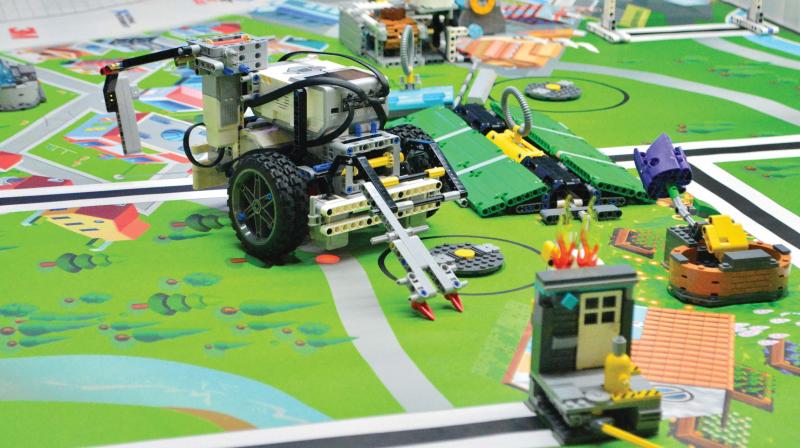Kids in robo land
Move over dance, music, art and craft, robotics summer camps are today’s trend.

A few decades ago, summer vacation camps used to be the time for typewriting courses or sewing classes. As time passed, students and parents had more options like swimming, arts and crafts etc. But the new trend is robotics summer camps and they are getting more popular among the kids in the state.
Camps are evolving with the times, adding activities to keep children engaged. Dance and music summer camps have gone out of fashion as academicians and parents have found out about robotics camps. When it comes to robots, reality still lags science fiction. But, just because robots and technology have not lived up to their promise in the past decades, does not mean that they will not arrive sooner or later. Now that it has come, robotics changed the way we used to look at the world. Though our part of the world was so late to welcome the phenomenon, looks like we are getting the buzz. But why have robotics camps become a trend?
Experts and educators on all levels value learning science, technology, engineering and math (STEM) and focusing on technology in education, but robotics has taken education to another level and for the past five years, the number of students attending the robotic summer camps has increased a lot. “Robotics has changed the way of the learning process for kids, creating the next evolution in teaching. That’s because introducing robotics to schools means making regular science subject skills and knowledge hands-on and fun, to prepare students for the future in a way that feels more like creativity and less like homework,” says Syed Shiyaz Mirza, principal of Government Vocational Higher Secondary School, Paraniyam. Robots have always been a captivating piece of technology and there is nothing quite as fun - and educational - as building one’s own robot and setting it through the paces of a race, an activity or a challenge.

“So, the main goal of these summer camps, which also prove to be the reason for the success of these camps, is that they encourage problem-solving, creative thinking and a healthy sense of competition that inspires students to be innovative,” says Syed.
The camps provide awareness and hands-on training also in machine learning and mobile app development. But programming and other STEM concepts can seem very abstract, especially to younger students. But Syed Shiya says Robotics is simpler to understand and a more tangible introduction to programming. “Teaching young students the abstract subject of programming can be challenging. Programming is often too complex for most students to grasp. Here, students can see how science, engineering, math, and technology work together and interact. They learn the skills needed to create precise and accurate instructions and have fun while learning some important things.”
Syed Shiya states that Robotics is a production-based learning module. Now that all kids have become tech-savvy and use gadgets, they don’t try to understand what’s inside the mobile. “Igniting the reverse engineering thought, a decent summer camp, with all the top-notch facilities, would help the kid think about what’s inside these gadgets and how to make them. Not a lot of fields combine creativity with engineering and technology as robotics does. When students are given the opportunity to create something interactive that they think is cool, their engagement levels increase, and they retain more information. Just like drones, the demand for robotic devices is more and more nowadays, so to realise the potential/interest of our kid in this field is much important to give him an amazing career.
Robotics is a field that is easily accessible to a wide range of students with varying talents and skills. Children with autism are able to easily respond to the consistent, calm, and clean interactions that robots give them. “Recently, there was a humanoid bootcamp conducted for techies and their children at Technopark, Thiruvananthapuram, which got great response, both from kids and parents.
Still, there is the question that if these kinds of concept-driven learning should be part of school curriculums in the state. Robotics in schools can help the students turn their frustration into creativity and innovation. “Robotics gives a valuable life lesson that teaches our students perseverance and determination when faced with challenges. It should be part of our education system, but the preparations we need to make are more. Above all, parents should get a grip of it.”
According to Shine Sridhar of Srishti Robotics Technologies in Kochi, the number of children learning the basics of robotics has seen significant rise and they have been preparing modules and presentations for school curriculum regularly. “The government has now identified the importance of robotics and artificial intelligence and is thinking about including them in the CBSE syllabus,” he said.

